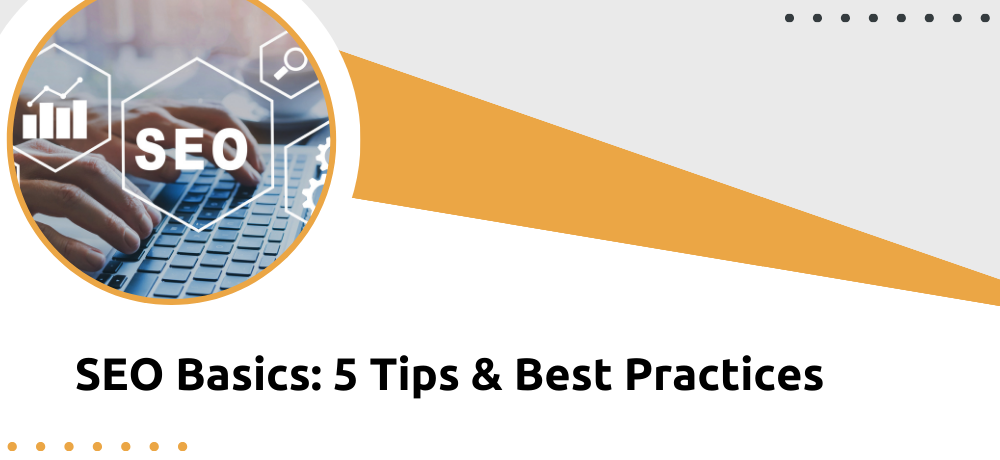
SEO Basics: 5 Tips & Best Practices
- Visibility Street Media & Marketing
Categories: Content Marketing , Digital Strategy Planning. , Digital Marketing
In the ever-evolving landscape of digital marketing, Search Engine Optimization (SEO) remains a cornerstone for businesses aiming to enhance their online visibility and attract organic traffic. As algorithms shift and consumer behaviors evolve, staying ahead with SEO best practices is essential for businesses to thrive in the competitive online arena. Whether you're a seasoned marketer or just dipping your toes into the digital realm, mastering the fundamentals of SEO can make a substantial difference in your online success. Let's dive into five essential tips and best practices to elevate your SEO game.
Tip 1: Conduct Comprehensive Keyword Research
Keywords are the building blocks of SEO. They are the phrases and terms your target audience types into search engines when looking for information, products, or services. Effective keyword research involves identifying relevant keywords that have high search volume and low competition. Tools like Google Keyword Planner, SEMrush, and Moz Keyword Explorer can assist in uncovering valuable keywords specific to your industry and audience.
Once you've compiled a list of potential keywords, prioritize those that align with your business objectives and target audience. Long-tail keywords, which are more specific and less competitive, can be particularly valuable in attracting highly targeted traffic. Incorporate these keywords strategically into your website content, including meta tags, headers, body text, and image alt attributes, to optimize your chances of ranking higher in search engine results pages (SERPs).
Tip 2: Optimize On-Page Elements
On-page optimization involves optimizing various elements of your website to improve its visibility and relevance to search engines. Start by ensuring that your website has a clear and intuitive structure, with logical navigation and easily accessible content. Each page should have a unique and descriptive title tag, containing relevant keywords, to help search engines understand its content.
Meta descriptions, although not a direct ranking factor, play a crucial role in attracting clicks from search engine users. Write compelling meta descriptions that accurately summarize the content of each page and entice users to click through to your site. Additionally, optimize your URLs, headings (H1, H2, etc.), and image alt text to make them descriptive and keyword-rich.
Tip 3: Create High-Quality, Relevant Content
Content is king in the world of SEO. Producing high-quality, relevant content not only attracts visitors to your site but also encourages engagement and earns valuable backlinks from other reputable websites. When creating content, focus on addressing the needs and interests of your target audience while incorporating relevant keywords naturally.
Consider diversifying your content formats to cater to different preferences and consumption habits. From blog posts and articles to videos, infographics, and podcasts, explore various mediums to deliver your message effectively. Additionally, regularly update and refresh your content to keep it relevant and valuable to your audience.
Tip 4: Prioritize Mobile-Friendly Design
With the increasing prevalence of mobile devices, optimizing your website for mobile users is no longer optional—it's imperative. Google's mobile-first indexing prioritizes the mobile version of websites for ranking purposes, making mobile-friendliness a crucial ranking factor. Ensure that your website is responsive and displays correctly on devices of all sizes.
Beyond responsive design, consider factors such as page load speed, mobile usability, and touchscreen compatibility. Streamline your website's layout and navigation for mobile users, making it easy for them to find what they're looking for and navigate seamlessly through your site. By prioritizing mobile-friendly design, you can enhance the user experience and improve your chances of ranking well in mobile search results.
Tip 5: Monitor, Analyze, and Adapt
SEO is not a set-it-and-forget-it endeavor—it requires ongoing monitoring, analysis, and adaptation to remain effective. Regularly track key metrics such as organic traffic, keyword rankings, bounce rate, and conversion rate to gauge the performance of your SEO efforts. Tools like Google Analytics and Google Search Console provide valuable insights into how users interact with your site and how it performs in search results.
Use this data to identify areas for improvement and fine-tune your SEO strategy accordingly. Experiment with different approaches, such as adjusting keyword targeting, refining on-page elements, or expanding your content strategy, and measure the impact of these changes over time. By staying vigilant and responsive to shifts in the digital landscape, you can maintain a competitive edge and continue to drive meaningful results through SEO.
In conclusion, mastering the basics of SEO is essential for businesses seeking to enhance their online visibility, attract organic traffic, and ultimately grow their digital presence. By conducting comprehensive keyword research, optimizing on-page elements, creating high-quality content, prioritizing mobile-friendly design, and continuously monitoring and adapting your strategy, you can establish a solid foundation for SEO success.
To learn more about how Visibility Street Media & Marketing can help you implement these SEO best practices and elevate your digital marketing efforts, please click here. If you have any questions or would like personalized assistance, don't hesitate to reach out to us at (530) 270-9195 or email us at kim@visibilitystreet.co. We're here to help you navigate the ever-changing landscape of digital marketing and achieve your business goals.
